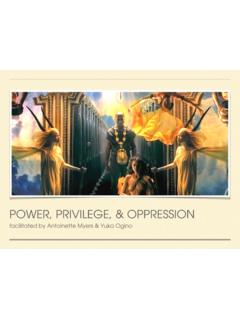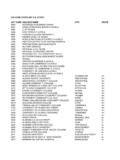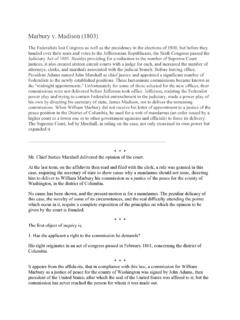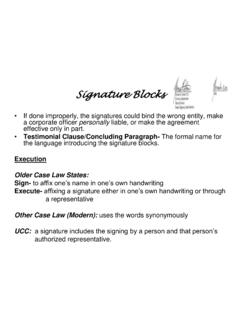Transcription of of Regents Hardy v. Jefferson Community College
1 March 7, 2022 Dear Vice President Wood, The Academic Freedom Alliance (AFA) is a coalition of faculty members from across the country and across the ideological spectrum who are committed to upholding the principles of academic freedom and professorial free speech. We are concerned about San Diego State University s handling of complaints involving Professor J. Angelo Corlett. According to published reports, Professor Corlett showed a slide in his class on Philosophy, Racism and Justice and his class on Critical Thinking and Composition that listed racial epithets. On March 1, a student who was not a member of the class came to Professor Corlett s office to initiate a discussion of those racial epithets. That same day, the university suspended Professor Corlett from teaching both classes based on student complaints.
2 You are quoted as saying that your removal of Professor Corlett s from his courses because of how he taught his courses is not about free expression or academic freedom. I write on behalf of the Academic Freedom Alliance to express our firm view that these disciplinary actions directed toward Professor Corlett are an egregious violation of his academic freedom. San Diego State University s Faculty Handbook points to the University Senate Policy File as the codification of university policies relevant to faculty. The Policy File in turn specifies an academic freedom policy. The policy resolves and reaffirms that SDSU s commitment to the protection of academic freedom .. include[s] faculty scholarship, teaching, creative activity, speech and service that faculty engage in while employed at SDSU and characterizes academic freedom as a core value that underlies its missions of teaching, scholarship and creative activity, and service tot eh public, our University, and the larger scholarly Community .
3 Moreover, SDSU has adopted a separate Freedom of Expression Policy that applies to faculty. It guarantees to faculty freedom of expression qualified only by reasonable regulations designed to avoid disruption of the mission of the university and the limits of the law. Notably, all legal speech, even offensive speech is permitted under that policy. That policy also recognizes that the principles established in the First Amendment of the United States Constitution .. apply to all faculty. The federal courts have specifically recognized that classroom speech by professors is constitutionally protected. Keyishian v. Board of Regents , 385 589 (1967); Hardy v. Jefferson Community College , 260 671 (6th Cir.)
4 2001). The Hardy court specifically rebuked a state university for caving in to public pressure to punish an instructor for discussing disparaging epithets and the impact they can have in a class on interpersonal communications. Indeed, the court found the actions of university officials in retaliating against a professor for such constitutionally protected classroom speech to be so egregious that those administrators could potentially be stripped of qualified immunity and be held personally liable for the constitutional violation. The United States Court of Appeals for the Sixth Circuit just months ago emphatically reaffirmed that the First Amendment does not tolerate state actions that cast a pall of orthodoxy over the classroom or that stifles a professor s viewpoint on a matter of public import.
5 Quite simply, the First Amendment protects the free-speech rights of professors when they are teaching. Meriwether v. Hartop, No. 20-3289, slip op. at 13 (6th Cir. 2021). As the American Association of University Professors has elaborated on the implications of this freedom to teach, it has repeatedly emphasized that classroom discussions of the type at issue here are well within the bounds of the principles of academic freedom to which SDSU has contractually committed itself and that are generally accepted within the profession. The AAUP s 1994 report on freedom of expression firmly concluded that it would be a breach of professional ethics and outside the bounds of academic freedom for a professor to ridicule or harass a student in the classroom, but that such verbal assaults had to be sharply distinguished from the expression of hateful ideas, including the words that are used to express those ideas.
6 Offensive speech must sometimes be mentioned in the classroom, and it is subversive of the protection of freedom of classroom teaching to depart from established legal standards of harassment to proscribe frank classroom discussions of the ideas, words and behaviors that might be used to harass. Likewise, the AAUP s 2007 report on freedom in the classroom emphasized that ideas that are germane to a subject under discussion in a classroom cannot be censored because a student with particular religious or political beliefs might be offended. It would be inimical to the free and vigorous exchange of ideas necessary for teaching and learning in higher education if professors could be sanctioned because of the reaction of one or more students to the words and ideas being discussed.
7 There is no question that the removal of Professor Corlett from the classroom is a form of university sanction. It is also quite obvious that removal or reassignment of Professor Corlett in specific response to controversial but instructionally germane material that Professor Corlett introduced into his classroom is not just relevant to his academic freedom but a grievous violation of is academic freedom. The AAUP has long emphasized that suspending a professor from his teaching duties is in and of itself a severe sanction second only to dismissal and should be undertaken only when absolutely necessary and with proper procedural protections. There can be no excuse for imposing such a sanction as a consequence of student or administrator disagreement with the content of a class.
8 If the freedom of teaching that is at the heart of academic freedom means anything, it must mean that faculty cannot be removed or reassigned because someone objects to the ideas being taught. It is not hard to see how this assertion of a unilateral power to reassign instructors who offend their students could have sweeping consequences for the freedom of university professors to teach contentious subject matter. A university could just as easily reassign a professor if a student objects to a professor teaching critical race theory, and the consequences for academic freedom would be just as dire. For San Diego State University to sanction a member of its faculty for making relevant instructional use of words in a class session that some students found offensive would violate its own contractual commitments to academic freedom and to the university s obligations under the First Amendment and would send a chilling message to every member of its faculty who must discuss difficult and controversial material as part of their teaching duties.
9 The Academic Freedom Alliance stands firmly behind Professor Corlett in this matter and calls on San Diego State University to adhere to its academic principles and to immediately and without prejudice reinstate Professor Corlett to his teaching duties. Sincerely, Keith Whittington Chair, Academic Committee, Academic Freedom Alliance William Nelson Cromwell Professor of Politics, Princeton University cc. President Adela de la Torre Professor J. Angelo Corlett Provost Salvador Hector Ochoa Dean Monica Casper Kelly Bendell, University Counsel Wil Weston, University Senate Chair Charles Toombs, California Faculty Association President







